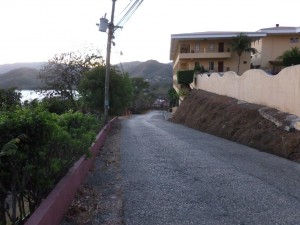
I was outside early this morning waiting to see the sunrise over the mountains beyond Potrero Bay to the east of us. I have no doubt that at 6:00 AM my appearance screamed, “Gringo!” As I sat on the wall along the road, a young couple was pushing a bike up the long, steep hill talking pleasantly with one another. When they got closer, their conversation stopped and they looked seriously at the ground as they approached where I was sitting. In my best (so far) Spanish, I said, “Hola! Buenos dias.” and I was struck by their response–they immediately looked up and broke in a very big smile and responded, “Muy bien.” (very well) and then resumed their previously interrupted conversation. I’d like to think the smile was because an obvious Gringo was friendly and addressed them in their native Spanish. An alternate explanation and not totally out of the question, of course, is they were laughing at my accent and/or pronunciation. I’ve discovered that very subtle differences in pronunciation are somewhat like a dog whistle to those of us from the USA…the sounds are simply inaudible to us. I’ve heard it said that Americans have a “lazy tongue” when it comes to speaking foreign languages–we tend to slur our words and not pronounce the vowel and consonant sounds distinctly. We also have a lazy ear because we often don’t hear the distinct sounds spoken to us. For example, my greeting of “Hola! Buenos dias.” means “Hello. Good morning.” However, a very subtle difference in pronunciation such as “Hola! Buenos dios.” (note the “o” instead of the “a” as in dias) means, “Hello. Good God !”. Not exactly sure which I said to the young couple.
 As I’ve been observing American tourists for a few days now and their interactions with the Tico people, quite a few of them have no clue about any Spanish words or phrases whatsoever. I would have thought they would at least have learned a few rudimentary phrases before embarking on their trip to a foreign country. In their interactions with shopkeepers, restaurant servers, and service people, there appears to be an attitude of, “I can find someone who speaks English (or enough English) so I don’t need to learn/use any of their language.” Yet, I’d wager, these very people are some of the most vocal critics of immigrants who come to the United States (legally or otherwise) and do not speak any English. It struck me how hypocritical we Americans can sometimes be. As guests in a foreign country, it is common courtesy to learn at least a little of the host country language. How much you learn may depend on the length of your stay. But for any trip planned in advance, learning a few key words and phrases and using them shows respect for the people and their beautiful country.
As I’ve been observing American tourists for a few days now and their interactions with the Tico people, quite a few of them have no clue about any Spanish words or phrases whatsoever. I would have thought they would at least have learned a few rudimentary phrases before embarking on their trip to a foreign country. In their interactions with shopkeepers, restaurant servers, and service people, there appears to be an attitude of, “I can find someone who speaks English (or enough English) so I don’t need to learn/use any of their language.” Yet, I’d wager, these very people are some of the most vocal critics of immigrants who come to the United States (legally or otherwise) and do not speak any English. It struck me how hypocritical we Americans can sometimes be. As guests in a foreign country, it is common courtesy to learn at least a little of the host country language. How much you learn may depend on the length of your stay. But for any trip planned in advance, learning a few key words and phrases and using them shows respect for the people and their beautiful country.
Costa Rica is home to some 50,000 folks from the United States according to the US Department of State. Lured by the beautiful countryside, exceptionally friendly and welcoming people and the favorable climate, it is a popular destination for tourists and those looking to retire frugally. Americans seem to live in clusters here and stick together. I wonder how many of them actually speak the language.
Food for thought…
